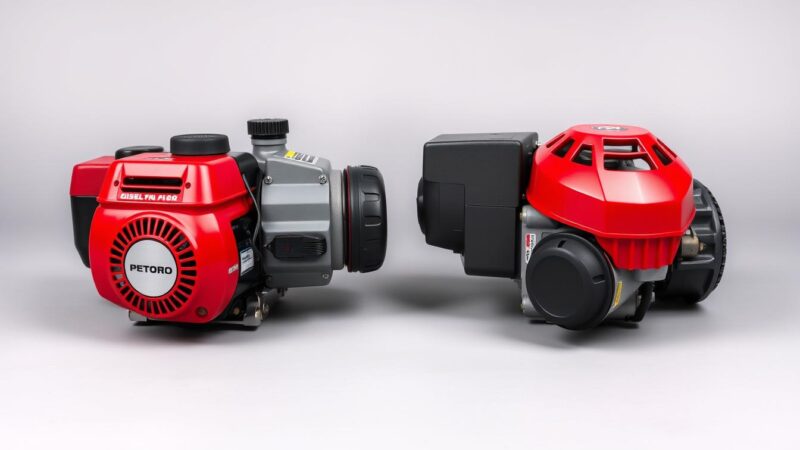Petrol vs. Diesel Lawn Mower Motors: Which is Better

The first internal combustion engine was introduced in lawn mowers in 1902 by Ransomes of Ipswich, England. This innovation started a long debate: petrol vs diesel lawn mower motors. Choosing the right motor is key for lawn care. Both petrol and diesel motors have their pros and cons.
We will look into lawn mower motors. We’ll discuss the benefits and drawbacks of petrol vs diesel engines. This will help you decide which is best for your lawn.
Recent engine technology advancements have made fuel consumption more efficient. This reduces fuel usage and emissions. Diesel engines offer more torque than gasoline engines, improving performance in thick or tall grass.
We will explore the main differences between petrol and diesel engines. We’ll compare fuel types, performance, and efficiency. This will help you choose the right lawn mower motor for your needs.
Understanding Lawn Mower Motors
A lawn mower motor is the heart of any lawn mower. It powers the blades and moves the machine. There are two main types: petrol and diesel. Petrol engines are found in smaller mowers, while diesel engines power larger, commercial mowers.
Petrol engines are cheaper upfront but cost more to run. Diesel engines, on the other hand, have high torque and are fuel-efficient. Fuel can start to break down in as little as 30 days. So, it’s key to use the right fuel for your mower.
- Petrol engines use a spark plug to ignite the fuel, while diesel engines rely on compression to ignite the fuel.
- Petrol engines are generally less expensive to purchase, but may have higher operating costs.
- Diesel engines are often more fuel-efficient, but may be more expensive to purchase.
Choosing the right lawn mower motor depends on your needs. Whether you choose petrol or diesel, regular maintenance is vital. This ensures your mower works well and efficiently.
Key Differences Between Petrol and Diesel Motors
Choosing the right lawn mower motor is key. The debate between petrol and diesel engines is ongoing. Each has its own benefits and drawbacks.
Diesel engines are more fuel-efficient and produce more torque. This makes them ideal for heavy-duty lawn care tasks.
Diesel engines are known for their fuel efficiency. They can run for longer periods without issues. This is great for commercial lawn care services that need mowers to run for hours.
The torque from diesel engines helps with efficient cutting, even in thick grass.
Diesel engines outperform petrol engines in terms of performance. They have more torque for better cutting, mainly in heavy-duty tasks. Yet, petrol engines are quieter and produce fewer emissions. This makes them better for residential areas.
- Diesel engines are more fuel-efficient and produce more torque
- Petrol engines are quieter and produce fewer emissions
- Diesel engines are better suited for heavy-duty lawn care tasks
- Petrol engines are more suitable for residential areas
The choice between petrol and diesel engines depends on your needs. If you want fuel efficiency and torque, diesel might be best. But if you prefer a quieter engine with lower emissions, petrol could be better.
Pros and Cons of Petrol Lawn Mowers
Petrol lawn mowers are a favorite for many because they’re affordable upfront and easy to find fuel for. They work well on big lawns over 200 square meters. Plus, they’re simpler to keep up than diesel mowers, with fewer parts to replace.
But, there are downsides to using petrol mowers. They cost more to maintain and use more fuel than diesel engines. Experts say diesel engines are more powerful and efficient over a wider range of speeds.
Here’s a quick rundown of the main points about petrol lawn mowers:
- Lower upfront costs
- Wider availability of fueling stations
- Easier maintenance
- Higher maintenance costs
- Lower fuel efficiency
- More emissions than diesel engines
Petrol mowers are great for those who want something easy to use and affordable. But, it’s important to think about the higher upkeep and fuel use. By looking at both sides, you can pick the right mower for you.
Pros and Cons of Diesel Lawn Mowers
Diesel lawn mowers are known for their efficiency and power. They are a top pick for lawn care. Diesel engines perform better when working hard.
Some key advantages of diesel lawn mowers include:
- Higher fuel efficiency
- More torque
- Lower maintenance costs
But, there are downsides too. They cost more upfront and can be noisy.
When picking a lawn mower, think about your lawn’s needs. Look at the advantages and disadvantages of each type. This way, you can choose the best mower for your lawn.
Cost Analysis: Petrol vs. Diesel
When looking at cost analysis, petrol and diesel lawn mowers have their own pros and cons. Petrol mowers are cheaper to buy but cost more to run over time. This is because they use more fuel and need more maintenance. Diesel mowers, on the other hand, cost more to buy but save money in the long run. They use less fuel and need less maintenance.
A study shows how important operating costs are when choosing a mower. It found electric mowers cut CO2 emissions by nearly 50% compared to gas mowers. But, electric mowers cost a bit more to own because of their higher initial price.
Important things to think about in the cost analysis of petrol vs diesel mowers include:
- Initial purchase price
- Fuel efficiency
- Maintenance costs
- Operating costs
By looking at these points, people can decide which mower is best for them. This includes considering the petrol vs diesel debate and the operating costs.
Environmental Impact of Petrol and Diesel
The environmental impact of lawn mowers is important. Petrol engines produce more emissions than diesel engines. Diesel engines burn fuel more efficiently, leading to lower emissions.
Diesel engines have a big advantage. They offer more power for every gallon of fuel compared to other options. This makes them a better choice for the environment. Plus, diesel mowers can finish jobs up to 50% faster, which means less emissions overall.
Some key benefits of diesel engines include:
- Lower emissions of nitrogen oxides and carbon monoxide
- Higher torque, allowing for higher blade tip speeds under demanding conditions
- Better fuel economy, resulting in more power generation with less fuel consumption
There are eco-friendly options for lawn care. For example, some diesel engines work with B5 diesel. This means up to 5% of the fuel can come from renewable resources. This helps reduce the environmental impact of lawn care.
Maintenance Requirements for Lawn Mower Motors
Keeping your lawn mower motor in top shape is key to its longevity and performance. Petrol and diesel motors need different care. For petrol motors, start with a check-up at the season’s start. Diesel motors, though, need less frequent upkeep.
For petrol motors, change the oil every 50 hours. Check the air filter every two years and inspect spark plugs yearly. Diesel motors need oil changes every 100 hours. Also, replace the air filter every 100 hours and clean the fuel system.
Here are some maintenance requirements for petrol and diesel motors:
- Petrol motors: oil changes every 50 hours, air filter checks every other year, spark plug inspections yearly
- Diesel motors: oil changes every 100 hours, air filter replacements every 100 hours, fuel system cleaning
Using genuine parts and following the maker’s guide can maximize your equipment’s life. Also, storing fuel right, like using non-ethanol and a stabilizer, prevents engine harm. By sticking to these upkeep tips, you can make your mower last longer and work better.
Regular upkeep can also save you money in the long run. A study shows diesel engines use 20-30% less fuel than petrol ones, cutting fuel costs. Plus, proper care prevents engine damage and keeps fuel fresh longer.
| Motor Type | Maintenance Requirements | Lifespan |
|---|---|---|
| Petrol | Oil changes every 50 hours, air filter checks every other year, spark plug inspections yearly | 5-10 years |
| Diesel | Oil changes every 100 hours, air filter replacements every 100 hours, fuel system cleaning | 15 years or more |
Ideal Use Cases for Petrol Lawn Mowers
Petrol lawn mowers are a favorite for garden care and home use. They are easy to use and maintain. They work best for small to medium-sized lawns, perfect for many homeowners.
For garden tasks like trimming and pruning, petrol mowers are a good pick. They are also quiet and have fewer emissions than big mowers, making them great for home use.
Benefits of Petrol Lawn Mowers for Garden Care
- Lightweight and easy to maneuver
- Ideal for small to medium-sized lawns
- Suitable for trimming and pruning tasks
Suitability for Residential Use
Petrol lawn mowers are easy to use and maintain, making them popular for homes. They are also affordable and have fewer emissions than big mowers.
Models like the Honda HRX217 and Husqvarna Automower series are favorites for home use. They come with features like shredding, bagging, and mulching.
| Model | Features | Suitable for |
|---|---|---|
| Honda HRX217 | Shredding, bagging, and mulching | Small to medium-sized lawns |
| Husqvarna Automower series | Autonomous maintenance, shredding, and mulching | Small to large-sized lawns |
Ideal Use Cases for Diesel Lawn Mowers
Diesel lawn mowers are perfect for big lawns and commercial jobs. They need more power and use fuel better. For lawns over four acres, use engines with 23 hp and cutting decks of 52 inches or bigger to save time.
Following commercial use tips can also help. This includes cutting down on idling and mowing at the right speeds. It cuts down on fuel use and emissions.
Keeping your mower in top shape is key. Make sure tires are at the right pressure and blades are sharp. Diesel mowers are great for tough tasks like mulching and bagging. They have more torque and cost less to maintain.
By following these tips, you can pick the best diesel mower for your needs. This ensures your mower works well and efficiently.
Commercial Use Guidelines
Diesel mowers for commercial use must meet EPA Tier-4i or Tier-4 Final standards. Using one machine for many tasks saves time, labor, and fuel. This is better than using separate machines for each job.
Good mowing patterns also help. They reduce the need for extra passes and save time moving between areas. This makes diesel mowers a solid choice for commercial lawn care.

